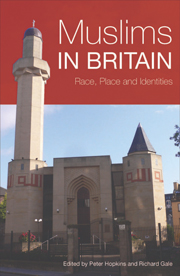Book contents
- Frontmatter
- Contents
- Acknowledgements
- List of contributors
- List of tables
- List of figures
- 1 Introduction: Muslims in Britain – race, place and the spatiality of identities
- Section 1 Gender, place and culture
- Section 2 Landscapes, communities and networks
- 6 British Arab perspectives on religion, politics and ‘the public’
- 7 The multicultural city and the politics of religious architecture: urban planning, mosques and meaning-making in Birmingham
- 8 Holy places, contested spaces: British Pakistani accounts of pilgrimage to Makkah and Madinah
- 9 Excess baggage or precious gems? The migration of cultural commodities
- Section 3 Religion, race and difference
- Afterword
- Index
8 - Holy places, contested spaces: British Pakistani accounts of pilgrimage to Makkah and Madinah
from Section 2 - Landscapes, communities and networks
Published online by Cambridge University Press: 05 August 2013
- Frontmatter
- Contents
- Acknowledgements
- List of contributors
- List of tables
- List of figures
- 1 Introduction: Muslims in Britain – race, place and the spatiality of identities
- Section 1 Gender, place and culture
- Section 2 Landscapes, communities and networks
- 6 British Arab perspectives on religion, politics and ‘the public’
- 7 The multicultural city and the politics of religious architecture: urban planning, mosques and meaning-making in Birmingham
- 8 Holy places, contested spaces: British Pakistani accounts of pilgrimage to Makkah and Madinah
- 9 Excess baggage or precious gems? The migration of cultural commodities
- Section 3 Religion, race and difference
- Afterword
- Index
Summary
Introduction
Taking a cue from Eade and Sallnow's (1991) key work in the anthropology of Christian pilgrimage, the present chapter is a study of the normative and contested accounts of sacred journeys to the holy places of Makkah and Madinah reported by Pakistani heritage Muslims in the UK diaspora. Following the likes of Durkheim (1912) and Turner (1974a, 1974b) respectively, Eade and Sallnow accept that pilgrimage both promotes social integration and the more temporary, liminal and anti-structural feelings associated with communitas. However, they also maintain that the reinforcement of social difference during sacred journeys is of equal significance. Specifically, then, this account documents: 1) British Pakistanis' symbolic constructions and ritual embodiments of sacred time and place, community and identity, during the various rites of hajj and other forms of pilgrimage; and 2) the cross-cutting and competing narratives of class and race, religious devotionalism and puritanism, that persist during pilgrimage.
Over two years, between 1999 and 2001, eighteen in-depth, semi-structured, interviews were conducted with respondents settled in Lancashire mill towns such as Bolton, Bury, Oldham, Rochdale and Nelson. Most interviewees traced their roots to Mirpur district in Pakistani-administered Kashmir (see Saifullah Khan 1977; Ballard 1983; Kalra 2000), while the ages of respondents ranged in more or less equal numbers across the following groups: those in their teens and twenties; thirties and forties; fifties to seventies.
- Type
- Chapter
- Information
- Muslims in BritainRace, Place and Identities, pp. 132 - 149Publisher: Edinburgh University PressPrint publication year: 2009

